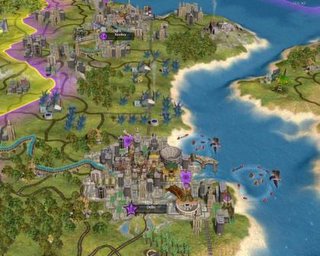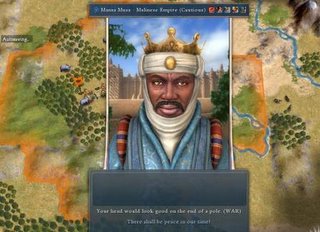 My favorite game is Civilization. It has recently been released in its fourth update. I find the game endlessly fascinating for its simulation of the progression of human advancement, its string of guns-and-butter choices, and its strategic view of war. Developing a civilization from clubs and sticks all the way to nuclear weapons is fun -- and hey, who doesn't like conquering the world in their spare time? Since I'm trying to keep busy, a single game still takes me several weeks from the dawn of mankind until victory, so it's a big deal to get a good game going.
My favorite game is Civilization. It has recently been released in its fourth update. I find the game endlessly fascinating for its simulation of the progression of human advancement, its string of guns-and-butter choices, and its strategic view of war. Developing a civilization from clubs and sticks all the way to nuclear weapons is fun -- and hey, who doesn't like conquering the world in their spare time? Since I'm trying to keep busy, a single game still takes me several weeks from the dawn of mankind until victory, so it's a big deal to get a good game going.The new version of the game is quite enjoyable. It adds the element of religion, which has a powerful effect early on in a game's life cycle, and diminishes in importance as a civilization matures. You get big cultural advantages for having a widespread religion and a civilization that adheres to a single faith, and missionaries of your religion are (perhaps not coincidentally) your first units that can effectively spy on your purported allies. Ultimately, it seems to be to a civilization's advantage to adopt an ethos of freedom of religion and secularize the government -- but then again, maybe that just suits my style of play.
 There is a military advantage to having a theocracy in the game.
There is a military advantage to having a theocracy in the game.I also very much enjoy how powerful culture is. Increasing a city's cultural richness earns the leader the loyalty of the people who live in and around the city, extending the civlization's extent of political control. So, unlike previous permutations of the game, culture is a primary objective, not a secondary one, and cannot be ignored even by the most militaristic of would-be world conquerors.
I also like that one can change one's perspective on the world -- literally, you can move the "camera" through which you view the world around. You can get wider and wider angles until the curvature of the Earth becomes apparent and you can see stars behind it (it rotates and has fast-moving weather patterns) and you can get close enough to see individual buildings and faces on the units. You can change the angle of view, too, although only within a range of ninety degrees. Mostly this is for fun; it's easiest to use the north-is-up perspective and find a range of mangification that is comfortable for moving the units around.
Strategic resources are even more important than in previous versions of the game as well. Competition for scarce resources drive every phase of history now, encouraging more frequent wars rather than a race to build the most refined civilization and then fighting it out (which is how I won all my Civ II and Civ III games). In the game I am playing now, I had to invade France to get coal because otherwise I could not build railroads; my homeland had no coal at all. So, that meant it was curtains for Louis XIV, who I otherwise would have left for last.
Taking over an enemy's city is a big deal, and it should be. We have plenty of real-life examples of how difficult it is to control an enemy's city through military force -- it can be done but it takes a concentration of forces far greater than that needed to control open countryside, and it takes the dedication to stick it out and calm the recently-conquered peoples in order to prepare them for assimilation into your (surely superior) culture.
 I do have some gripes, though. The diplomacy does not seem to work very well and I have so far detected little, if any, differences in the "personalities" of the AI opponents. You are never able to get a good deal and can almost always "game" the diplomacy to find out exactly what the AI player will or will not agree to. And, the AI players carry grudges until the end of time after making unreasonable demands. For instance, Caesar may ask you to embargo Genghis Khan in 2000 BC, and if you don't, he will still hold it against you in 2000 AD, over 400 game turns later. At some point, you'd think he'd let it go. It's also very difficult to get alliances formed with the AI players and once you build the United Nations, you do not have a whole lot of control over how it is used.
I do have some gripes, though. The diplomacy does not seem to work very well and I have so far detected little, if any, differences in the "personalities" of the AI opponents. You are never able to get a good deal and can almost always "game" the diplomacy to find out exactly what the AI player will or will not agree to. And, the AI players carry grudges until the end of time after making unreasonable demands. For instance, Caesar may ask you to embargo Genghis Khan in 2000 BC, and if you don't, he will still hold it against you in 2000 AD, over 400 game turns later. At some point, you'd think he'd let it go. It's also very difficult to get alliances formed with the AI players and once you build the United Nations, you do not have a whole lot of control over how it is used. But my biggest gripe is that in the twentieth century, the game starts to crash. Originally, it crashed pretty much once you hit 1750, but an update was written to work around that. Now, crashes start happening in the 1960's. I've got a game right now where I've managed to get just about half the real estate on the planet, and just under half the population, under my control. I've jockeyed my diplomacy so that I'm ready to take on one of the other powers and every time I get the war started and start taking over cities, the game continues to crash suddenly. If I'm lucky, I can complete an entire turn before the crash and it's only my paranoia to save the game every two minutes that has enabled me to make any progress at all. I hope this gets fixed soon.
But my biggest gripe is that in the twentieth century, the game starts to crash. Originally, it crashed pretty much once you hit 1750, but an update was written to work around that. Now, crashes start happening in the 1960's. I've got a game right now where I've managed to get just about half the real estate on the planet, and just under half the population, under my control. I've jockeyed my diplomacy so that I'm ready to take on one of the other powers and every time I get the war started and start taking over cities, the game continues to crash suddenly. If I'm lucky, I can complete an entire turn before the crash and it's only my paranoia to save the game every two minutes that has enabled me to make any progress at all. I hope this gets fixed soon.So it's a fun game -- but not all the bugs are worked out, even after the most recent software patch. It would have been far, far better had the manufacturer addressed these bugs before releasing the game, but that does not seem to be how the computer game industry works.







2 comments:
I sure enjoyed the game when I played it. Games are a great way to have fun, kinda like crack, but cheaper.
No, crack is cheaper.
Post a Comment